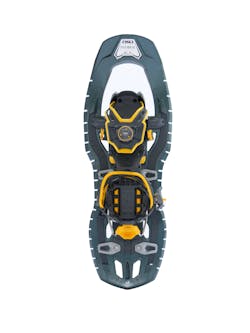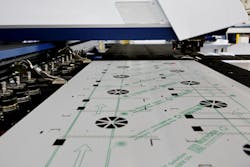Materials emphasizing sustainability, automotive innovations hit the market
By Ron Shinn
The transition from cars and trucks powered by internal combustion engines to cleaner electric power is beginning to impact plastics processors, but materials companies have already been busy developing new resins that can withstand higher temperatures, resist harsh chemicals and provide new opportunities for designers.
Automotive parts that have traditionally been made from metal are transitioning to plastic or a combination of plastic and metal. For example, compartments for large batteries need large housings that can dissipate heat, so materials suppliers are developing solutions that can handle the heat, as well as reduce vehicle weight.
The automotive evolution is happening at the same time material makers are under pressure from their customers to provide more sustainable choices.
Here are some interesting new products from K 2022.
DuPont/Celanese products developed for EVs
DuPont released new materials at K 2022 aimed at the fast-evolving electric vehicle (EV) battery market. DuPont finalized the sale of its Mobility & Materials business unit to Celanese Corp. on Nov. 1, so these materials are now available from Celanese.
The first grades are Zytel FR70G30V0NH2, based on PA66 nylon, designed for good mechanical properties, low mold deposit, easy processing and laser transparency for laser welding; Zytel FR73G30V0NH2, based on PA6 nylon, for high flow, good aesthetics, low mold deposit and easy processing; Zytel HTN FR53G50NH and FR53G30NH2, based on polyphthalamide (PPA), for structural parts, good surface appearance and dimensional stability; and Crastin LWFR864NH2, based on polybutylene terephthalate, for the low warpage needed in long, thin parts common to EV batteries, with electrical properties up to 338 degrees Fahrenheit.
“We developed these materials to help designers achieve safety — flame resistance, electrical performance, and, when applicable, also stable high-voltage color — without compromising performance,” said Giacomo Parisi, DuPont global marketing director for automotive electrification, mobility and materials, in a news release.
These new non-halogen, flame-retardant materials resist chemical degradation from fluids being used in EVs for thermal management.
In a separate announcement, Celanese said it now has a hybrid plastic/metal cooling plate for batteries used in EVs. The product was developed with automotive Tier 1 supplier Novares. A patented bonding technology allows metal and plastic parts to be bonded despite different thermal expansion properties.
Celanese’s Zytel HTN high-temperature nylon is used for the bonded part. The process enables quick hot-plate welding of aluminum to injection molded parts. The company said it believes the process can be extended to many other industries.
“Our plastic/metal bonding technology is a game-changer for manufacturers of automotive components, and it will quickly find uses in other industries,” said Gabe Knee, DuPont marketing manager of vehicle electrification.
In another interesting automotive application, a different Zytel version was used in a project with Chinese Tier 1 automotive supplier Shenzhen VMAX New Energy Co. Ltd. for a wireless charging unit. The system uses a vehicle receiving pad attached to the car’s chassis and a transmission plate mounted on the floor that is connected to a power source.
HTNFR53G30NH, a 30 percent glass-filled PPA, protects the transmission unit from heavy loads, moisture, extreme temperatures, and ultraviolet-
light and salt damage.
Solvay resins focus on automotive applications
Solvay introduced two PPA-based lines for EVs at K 2022.
Amodel Supreme PPA is aimed at automotive systems requiring thermal, mechanical and electrical properties, ranging from high-temperature components used in electric drives such as e-motors, power electronics, housings for electrical connectors and telecommunications components that need heat resistance.
Solvay said the material is stiff and tough enough to replace metal in traditional and structural applications, such as clutch cylinders.
Amodel Supreme PPA’s six grades are divided into standard, structural and electrical products.
Separately, Solvay announced its launch of Amodel Bios, a new family of partially bio-based, long-chain PPA materials for electric and electronic e-mobility applications. Solvay said the renewable feedstock content is from non-food competing sources.
At 275 degrees Fahrenheit, Solvay said Amodel Bios materials offer the highest glass-transition temperature of all bio-based PPA in the market. The materials have a melting point of 599 degrees Fahrenheit.
The materials are designed for injection molding. There are four grades tailored for structural, electrification and flame-retardant applications.
LyondellBasell’s CirculenRenew PE, made from renewable sources, is the basis for a new line of protective films that can be used on all types of surfaces.
The company said the new film made from CirculenRenew is the first bio-based protective film on the market. It is being commercialized under the name Oxygen Vegetal.
LyondellBasell worked with two French companies, a film converter and a protective films manufacturer, to develop the new product.
A LyondellBasell official stressed that CirculenRenew polymers can be used interchangeably with virgin material.
“CirculenRenew polymers do not require changes in an existing manufacturing process, which makes them easy to use,” said Paula Sanabria-Luque, associate director for circular polymer solutions for Europe.
LyondellBasell said the materials are based on the mass-balance approach. The mass-balance approach is a chain-of-custody model that lets chemical and plastics businesses incrementally transition to using sustainable feedstocks without the need to set up separate production lines.
Another new application is a snowshoe from French manufacturer TSL made from CirculenRecover PA. It contains approximately 80 percent recycled material. LyondellBasell makes CirculenRecover from mechanically recycled source material.
LyondellBasell said the material is highly resistant to impact and cold temperatures, and durable over time.
Ron Shinn, editor
Contact:
Celanese Corp., Sulzbach, Germany, 49-162-536-9078, www.mobility-materials.com
LyondellBasell Industries, Houston, 713-309-7200, www.lyondellbasell.com
Solvay America Inc., Houston, 713-525-6000, www.solvay.com
About the Author
Ron Shinn
Editor
Editor Ron Shinn is a co-founder of Plastics Machinery & Manufacturing and has been covering the plastics industry for more than 35 years. He leads the editorial team, directs coverage and sets the editorial calendar. He also writes features, including the Talking Points column and On the Factory Floor, and covers recycling and sustainability for PMM and Plastics Recycling.


